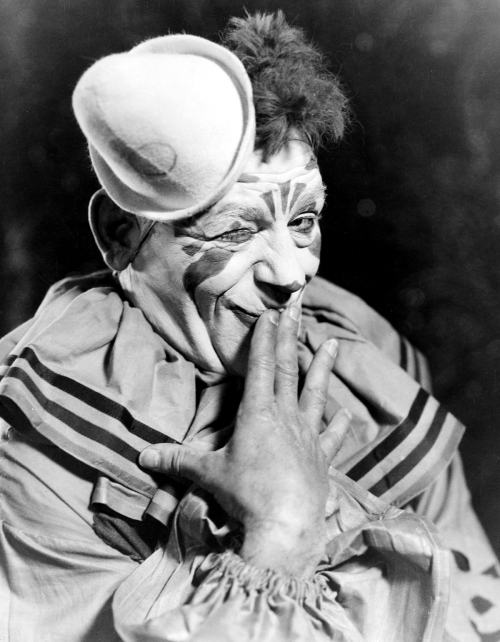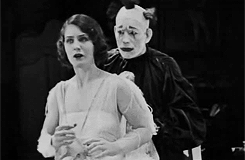Ah, o circo! O picadeiro maravilhoso, o mágico que tira o coelho da cartola, o palhaço sempre tão feliz! O cheiro da pipoca ou do cachorro-quente embala a ideia de que tudo pode acontecer ali. Todos adoram o mundo mágico do circo. Mas, se Lon Chaney fizer parte do espetáculo, tome cuidado: algo trágico está próximo.
Oh, the circus! The wonderful show, the magician taking off a rabbit from his hat, the clown who is always so happy! The smell of popcorn or hot-dog and the sensation that everything can happen there. Everybody loves the wonderful world of the circus. But, if Lon Chaney is part of the show, beware: something tragic will happen.
Quando Chaney trabalha no circo, a história em geral envolve amor não-correspondido, segredos do passado, obsessão e morte. Alguns dos melhores filmes de Chaney se passam no circo, entre eles a obra-prima do ator e do diretor Tod Browning: “O Montro do Circo”, de 1927.
When Chaney works at the circus, the story in general involves unrequited love, secrets from the past, obsession and death. Some of Chaney's best films have the circus as background, among them the masterpiece he and director Tod Browning made together: “The Unknown”, from 1927.
Muitas vezes os palhaços são representados como pessoas que têm como profissão fazer os outros sorrirem, mas que são muito infelizes ou que sofreram algum grande trauma. Isso acontece em “Lágrimas de Palhaço” (1924), e ninguém pode imaginar o passado de glórias e a grande humilhação que levaram o triste Paul Beaumont (Chaney) a se tornar um palhaço de circo. E o filme ainda envolve um triângulo amoroso (que evolui para um quadrilátero amoroso) com Chaney, Norma Shearer e John Gilbert.
In many occasions clowns are portrayed as the ones who make other people laugh all the time, but are, in real life, very sad people, who suffered a deep trauma. This happens in “He who gets slapped” (1924), and no one can imagine the glories of the past and the huge trauma that made Paul Beaumont (Chaney) run away with the circus. The film also involves a love triangle (that evolves into a love quadrilateral) with Chaney, Norma Shearer and John Gilbert.
Quando o circo chega à cidade em “Ridi, Pagliacci!” (1928), a vida para e nada é mais importante que o espetáculo. O tal circo pode ser apenas uma dupla de palhaços, mas a alegria é garantida com Flik e Flok, ou melhor, Tito (Lon Chaney) e Simon (Sam Spiegel). Tudo muda quando Tito encontra uma garotinha abandonada à beira do rio e decide adotá-la. Chamada de Simonetta, ela cresce no meio circense e Tito finalmente percebe que a ama – e não como um pai adotivo.
When the circus arrives in town in “Laugh, Clown, Laugh” (1928), life stops and nothing is more important than the show. The said circus is only made of two clowns, but alughs are guaranteed with Flik and Flok, or better, Tito (Lon Chaney) and Simon (Sam Spiegel). Everything changes when Tito finds a little girl abaonded near a river and decides to adopt her. Called Simonetta, she grows up among the circus people and Tito finally realizes that he loves her – and not like a foster father.
Em “O Monstro do Circo”, Chaney é o atirador de facas Alonzo, que se apaixona pela filha do dono do circo, Nanon (Joan Crawford). O detalhe que torna o truque interessante é que Alonzo não tem braços, de modo que ele atira as facas com os pés, e na verdade ele está apenas no circo para fugir da polícia. Nanon, por ser muito bonita, tem de lidar com cantadas indesejadas e tem pavor de que homens a abracem... o que é uma grande vantagem para Alonzo.
In “The Unkonwn”, Chaney is the knife-thrower Alonzo, who falls in love with the circus owner's daughter, Nanon (Joan Crawford). The detail that makes the trick interesting is that Alonzo has no arms, só he has to throw the knives with his feet, and he actually joined the circus to escape the police. Because Nanon is very pretty, she has to deal with men approaching her without invitation and she has developed a fear of being hugged – which is a great advantage for Alonzo.
Ao contrário de muitos pioneiros do cinema, Lon Chaney não começou a carreira no circo. Por ser filho de pais surdos, ele era muito bom com mímica, e começou a trabalhar diretamente no vaudeville em 1902. Em pouco tempo ele conheceu sua esposa, Cleva, também artista de vaudeville. Chaney fez seu primeiro filme em 1913, mas alcançou o estrelato apenas em 1919, com o filme “The Miracle Man”, que hoje está perdido.
Unlike many other film pioneers, Lon Chaney didn't have a circus background. Being a CODA (child of deaf adults), he was very good with pantomime, and started directly in vaudeville in 1902. It wasn't long until he met his wife, Cleva, also a vaudevillian. Chaney started making movies in 1913, but achieved stardom in 1919, with the now lost film “The Miracle Man”.
O circo é um lugar de mágica, sorrisos, gargalhadas, mas também de emoções e mesmo algumas lágrimas. Os três filmes de crico de Lon Chaney, aqui citados, merecem ser vistos, sendo “O Monstro do Circo” o mais surpreendente de todos. Eu não posso elogiar Chaney o suficiente. Ele foi, de fato, o Homem de Mil Faces, e 500 toneladas de talento.
The circus is a place of magic, smiles, laugh but also of thrills and even a few tears. Lon Chaney's three circus films, covered here, are all worth-watching, being “The Unknown” the most surprising of them all. I can't praise Lon Chaney enough. He was, indeed, the Man of a Thousand Faces, and 500 tons of talent.
This is my contribution to the At The Circus Blogathon – The Grand Finale, hosted by Summer at Serendipitous Anachronisms and me right here.










0 Yorumlar